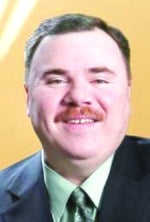But Can They Write A Memo? | Professional group based at WPI looks to ready scientists
 Photo/Courtesy
Stephen Lemire, National Professional Science Master's Association.
Photo/Courtesy
Stephen Lemire, National Professional Science Master's Association.
Think of a scientist or a mathematician, and the first things that come to mind may not be interpersonal skills or a focus on the bottom line. That’s where the National Professional Science Master’s Association comes in.
The association, housed at the Worcester Polytechnic Institute in Worcester, is a one-year-old umbrella group for about 60 colleges and universities across the country that offer master’s degrees in “professional science.” The programs, which began appearing about 10 years ago, are designed to turn out graduates who are whizzes in the lab but also know how to manage teams and bring products to market.
“The need is really being dictated by the employers,” said Stephen Lemire, executive director of the NPSMA. “The employers require graduate-trained clinicians—either scientists or mathematicians—that have some business training.”
Next Stop: UMass
Lemire said the association is planning talks with the University of Massachusetts later this month in the hopes of implementing professional science master’s programs across the university system.
He said the California, New York and North Carolina state university systems already have such programs, and more are in the works in other states.
So far, the only Massachusetts institutions with the programs are WPI and Northeastern University in Boston
The WPI program, which started in 2001, actually consists of two degrees, in financial mathematics and industrial mathematics. The financial program prepares graduates for careers in fields like banking, insurance, investments and utilities, while the industrial one is aimed at jobs in a wide range of industries, including software, chemical manufacturing, telecom and engineering research.
“Traditionally master’s programs at most institutions are stepping stones into going into a PhD program, or consolation prizes if you leave a PhD program,” said Marcel Blais, who coordinates the WPI programs. “These are more geared to those going into industry.”
Blais said many students in the program are working professionals who take classes at night in the hopes of moving up more quickly in their organizations.
Kimberly Cole, a scientist at New England Peptide in Gardner, said courses in business would have been a welcome addition to her college education. Cole received a BS in science from Fairfield University in Connecticut in 2001 and went straight to work at the Gardner production facility.
She said it took some effort to learn customer relations, pricing and time management skills on the fly.
“I think the biggest adjustment between going from academia to someplace like New England Pepitide, which is actually a production facility, is the timelines that you have to deal with, and dealing with customers when those timelines aren’t met,” she said.
In fact, Cole said, taking a few business classes could be helpful even for scientists who remain in academia, to help them write budgets for research projects that in some ways function like small businesses.
“You’re dealing sometimes with huge amounts of grants,” she said, “And at the end of the time they want you to produce something.”
One of Cole’s colleagues, project manager Kristin Byrne, had a different perspective. Despite not taking any business classes while she earned her BS at UMass Amherst, she said she had little trouble moving from a tech job at New England Peptide to managing a team and working with customers.
“To me it feels very natural,” she said. “I love working with customers.”
She said it helped that she spent a couple of years at the company before taking on a higher level position. For someone going straight from school to job like her current one, she said, it might be helpful to study business.
Big Fish, Small Ponds
In general, Lemire said, the professional science master’s programs can work for scientists in all sorts of positions, but they may be particularly well suited to those going to work at small companies with fewer than 100 employees since graduates are well equipped to wear multiple hats.
And he said one specialization that is growing particularly quickly is a program aimed at scientists who hope to start their own companies after graduation.
“Entrepreneurship as a discipline within the professional master’s science industry is one of the trends that is taking off,” he said.
Across the country, professional science master’s programs cover a wide range of fields.
Of the 117 programs that the NPSMA counted in May, 36 are in biology and biotechnology, 18 are in bioinformatics and computational biology, 15 are in environmental and geological sciences and 13 are in mathematics and statistics.
Lemire said 2,800 students are enrolled in the programs now, and more than 2,000 have graduated from them. He said he expects to see the programs grow by 25 percent in the next few years.
To help facilitate that growth, the NPSMA has been gathering information about the existing programs.
It’s planning its first national conference in Atlanta this November, and Lemire said one of its other big tasks is reaching out to more employers who can support the programs at particular colleges and hire their graduates.
So far, many corporations that might be interested in the programs aren’t aware of them.
At Waters Corp. in Milford, Global Staffing Manager Mark McAuliffe said he hadn’t heard of professional science degrees, but he can easily see how they could be valuable.
Employees at the company need “not only the technical aptitude, but also an appetite for the business of science,” he said.









0 Comments